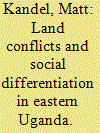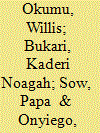|
|
|
Sort Order |
|
|
|
Items / Page
|
|
|
|
|
|
|
| Srl | Item |
| 1 |
ID:
155003


|
|
|
|
|
| Summary/Abstract |
This paper aims to contribute to debates about humanitarian governance and insecurity in post-conflict situations. It takes the case of South Sudan to explore the relations between humanitarian agencies, the international community, and local authorities, and the ways international and local forms of power become interrelated and contested, and to what effect. The paper is based on eight months of ethnographic research in various locations in South Sudan between 2011 and 2013, in which experiences with and approaches to insecurity among humanitarian aid actors were studied. The research found that many security threats can be understood in relation to the everyday practices of negotiating and maintaining humanitarian access. Perceiving this insecurity as violation or abuse of a moral and practical humanitarianism neglects how humanitarian aid in practice was embedded in broader state building processes. This paper posits instead that much insecurity for humanitarian actors is a symptom of the blurring of international and local forms of power, and this mediates the development of a humanitarian protectorate.
|
|
|
|
|
|
|
|
|
|
|
|
|
|
|
|
| 2 |
ID:
155005


|
|
|
|
|
| Summary/Abstract |
Rising competition and conflict over land in rural sub-Saharan Africa continues to attract the attention of researchers. Recent work has especially focused on land governance, post-conflict restructuring of tenure relations, and large-scale land acquisitions. A less researched topic as of late, though one deserving of greater consideration, pertains to how social differentiation on the local-level shapes relations to land, and how these processes are rooted in specific historical developments. Drawing on fieldwork conducted in Teso sub-region of eastern Uganda, this paper analyses three specific land conflicts and situates them within a broad historical trajectory. I show how each dispute illuminates changes in class relations in Teso since the early 1990s. I argue that this current period of socioeconomic transformation, which includes the formation of a more clearly defined sub-regional middle class and elite, constitutes the most prominent period of social differentiation in Teso since the early 20th century.
|
|
|
|
|
|
|
|
|
|
|
|
|
|
|
|
| 3 |
ID:
155004


|
|
|
|
|
| Summary/Abstract |
Despite their centrality to the rhythm and practice of everyday urban life, there are, surprisingly, few studies on commercial minibus-taxis as a microcosm of city life in Africa, especially its precarious materiality. Using the trademark yellow minibus-taxis (danfos) in Lagos as a frame of reference, this paper explores what an interpretative analysis of the slogans that danfo workers paint on their vehicles can tell us about the city in which they weave their routine existence, especially the hopes, fears and actual material circumstances which informed their unique choice of slogans. Foregrounding the danfos as mobile bodies of meaning, the article finds that slogans not only reflect the lived realities of danfo workers, but are themselves vital means through which these workers get by, define their identity and expand their horizons of possibility.
|
|
|
|
|
|
|
|
|
|
|
|
|
|
|
|
| 4 |
ID:
155007


|
|
|
|
|
| Summary/Abstract |
This paper argues that violent conflict prominently impacts on land governance and so contributes to land conflicts in post-conflict settings. In the natural resources literature, the relationship between land and conflict is often explained in terms of environmental security or political ecology, and many have pointed out that the way land is governed in itself may be a source of conflict. However, less attention has been given to the effects of violent conflict on land and its governance in post-conflict situations. This paper argues that violent conflict affects land governance in many ways and that this in turn might contribute to further violent conflict. The argument builds around an extended case study of the Apaa evictions in Amuru District in Northern Uganda. The case illustrates how conflict around land is not just the result of resource scarcity and competition, but is the outcome of a combination of political, historical and social dynamics. Past policies on land and practices of land governance play a critical role in this. However at the same time, violent conflict has a critical impact on land access, transforms land governance authority and the rules applied. The land conflicts resulting from this, in turn, fuel ethnic tensions between local population groups, and grievances about those in power and the institutions that govern natural resources. The ways in which such problematic conflict-induced changes in land access and governance are dealt with by policymakers is critical for post-conflict stability.
|
|
|
|
|
|
|
|
|
|
|
|
|
|
|
|
| 5 |
ID:
155008


|
|
|
|
|
| Summary/Abstract |
This paper argues that livestock raids and pastoralists’ competition over water and pastures in north-western Kenya are manifestations of local ethnic political contests and rivalries. The culture of raiding among the Samburu, Turkana, Pokot, Borana, Gabra and Rendille communities has changed over the last 40 years. Whereas elders were once the gatekeepers of communal institutions, today new actors are at the forefront of new forms of violent raids. Among Samburu and Turkana communities, politicians and shrewd businessmen have emerged to exploit ethnic rivalry that exists between these groups and use it to mobilise raids. These political and business elites play influencing roles in raiding by paying and arming warriors to carry out raids. Competition for political influence is closely intertwined with competition over scarce water resources and grazing pastures among Turkana and Samburu. Given that pastoralists survive on decreasing pasture and water resources, our study shows that political elites arm their communities during the dry season to gain the upper hand in contests over access to limited resources. Livestock raids no longer occur in the traditional context of restocking, but rather as an expression and manifestation of local ethnic politics and political contests between ethnic kingpins. The study uses primary field data from a case study collected through in-depth interviews, oral history and group discussions with various actors.
|
|
|
|
|
|
|
|
|
|
|
|
|
|
|
|
| 6 |
ID:
155006


|
|
|
|
|
| Summary/Abstract |
The hallmark of accountability in a democracy centres on the way the elected parliament holds the executive to account. If the parliament does not perform its oversight role effectively, lower authorities would have fewer incentives to do the same vis-à-vis local executives. In this article we therefore ask whether or not different meanings of accountability can be discerned amongst Tanzanian Members of Parliament (MPs). In our Q-method research we found four clearly identifiable discourses on accountability amongst Tanzanian MPs: Partycrats; My Electorate's Advocates; Frustrated Account Holders; and Pragmatic Account Holders. We understand MPs discourses within the broader context of political clientelism and we argue that this combination of discourses, or accountability culture, enables the executive to rule in semi-autocratic ways. Even if opposition parties would obtain a parliamentary majority, this accountability culture stands in the way of achieving greater democratic responsiveness.
|
|
|
|
|
|
|
|
|
|
|
|
|
|
|
|
|
|
|
|
|